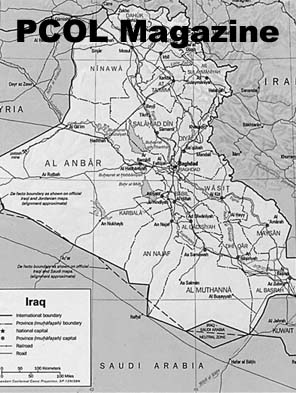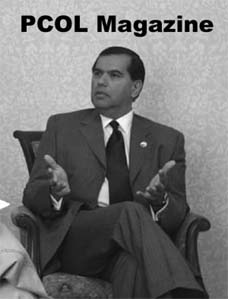
Jamaica RPCVs Haven and Rose Whiteside witnessed chaos in Iraq
Former Brunswick residents Haven and Rose Whiteside whitness chaos inside Iraq.
BRUNSWICK — If U.S. soldiers risk their lives for war, then pacifists should be willing to take risks for peace.
This reasoning compelled former Brunswick residents Haven and Rose Whiteside to spend five weeks in war-blighted Baghdad earlier this year working on behalf of Iraqi detainees they say were imprisoned without reason, in a war they believe had no justification.
Months before the news of abuses by U.S. forces at Abu Ghraib prison made it into the American media, the Whitesides were working to document prison conditions, set up legal proceedings and reunite detainees with their families.
In Baghdad, the Whitesides attended themselves not to the relatively small number of violent insurgents waging battles against U.S. troops, but to the by far greater number of peaceful Iraqis who are nonetheless saddled by the strife in their country.
What they observed were Iraqi men being rounded up indiscriminately in the middle of the night by U.S. troops. Many prisoners, say the Whitesides, were detained for months without formal charges, without access to legal representation and without being allowed to contact family members. Left behind were wives, mothers and children forced to scrape together a living all the while wondering what had become of the men, they said.
This situation, combined with street violence, a lack of infrastructure and an unstable economy, left the typical Iraqi feeling hopeless, the Whitesides said, regardless of the joy most felt at being freed from the oppressive regime of Saddam Hussein.
The Whitesides said an engineer named Laayla told them, "The common people don't know their future. We want to live. We thought life would be better, but we only see danger."
The Whitesides traveled to Iraq in December and January as part of a Christian Peacemaker Team, a Chicago-based peace organization with volunteers stationed in such conflict-torn areas as Hebron, along the Palestine/Israel border, and the civil war-wracked town of Barrancaberrneja, Colombia.
Haven Whiteside, a soft-spoken 73-year-old, calls international volunteer service his third career. His first was as a Harvard-trained physics professor. His second career was spent as a policy analyst for U.S. Sen. Edmund Muskie, D-Maine, and as deputy director for the State of Maine Office of Policy and Legal Analysis.
Haven and Rose, who now live in Florida, formally became international volunteers when they joined the Peace Corps in 1990 and spent three years in Jamaica. Ideologically, however, the pair had committed themselves to peace during the Vietnam War.
"Just seeing the soldiers come back maimed, I thought there has to be a better way. We wanted to do whatever small thing we could do," said Rose Whiteside, who is 71.
Before visiting Iraq, the Whitesides had already been to Haiti, Honduras and Colombia, but in Baghdad, they saw a different kind of war. In Iraq their own country occupied an entire nation in which the vast majority of its citizens play no role in the ongoing violence. Yet it is the civilian Iraqis who suffer the consequences, they say.
On their first day in Baghdad, an explosion killed two Iraqi civilians near their apartment, which overlooked the concrete wall separating the so-called "green zone," where foreign troops are stationed, from the rest of the country.
American troops had been the target of that particular bomb, but the victims were civilians.
"I'm not used to bodies lying on the street," said Haven Whiteside. "And that was our welcome to Baghdad."
Everyone the couple met, with very few exceptions, said they were happy to see Sadaam Hussein gone. But many did not understand the continued presence of foreign troops and many had little hope for their country's future with or without the occupying forces.
A founding member of the Baathist party, whom the Whitesides met in Jordan, summed up the conundrum in this way: "If (the U.S.) leaves, it is a mistake. If you stay, it is a disaster."
The couple spent much of their time in Iraq trying to set up meetings between attorneys and U.S. troops on behalf of Abu Ghraib prison detainees, many of whom, they say, were held for months without being charged and without being allowed to contact anyone outside the prison walls.
"At that point there were so many detainees, and they hadn't set up a process for keeping track," said Rose Whiteside.
They met one man who had been rounded up in a nighttime raid that was supposed to have taken place at the house next door. The troops had gotten the address wrong, according to the Whitesides.
Many prisoners reported decent treatment in prison, they said, but this individual was so pained by his experience, he refused to talk about it.
The Whitesides said that all the U.S. troops they met were dedicated people who believed in the work they were doing in Iraq. Many, they said, volunteered their time building schools and working in the communities when not on duty.
Yet while individual troops might be doing positive work in Baghdad, the U.S. forces as a whole are doing more harm than good, the Whitesides believe.
"I just believe the violence and the terror would somehow be less if we weren't there," Rose Whiteside said. "There has to be a better way."

